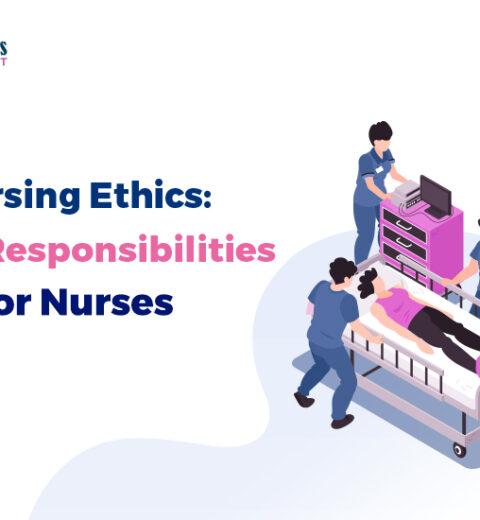If you have heard that the “student nurses should get clinical supervision”, then you heard it right! The Director, NMC Professor Geraldine Walters has emphasized that the “student nurses” should get clinical supervision even while they study. While this has been in effect since January 28, 2019, Professor Geraldine Walters has recapituated this recently that every student should demonstrate clinical supervision and reflection as part of their learning journey.
In a letter to universities and as stated in the Nursing Times, Professor Walters goes on to say that the NMC’s standards “support clinical supervision as a recognised part of clinical practice” and that it “expects practice learning partners to have the capacity and capability to provide this”.
While we ponder on whether clinical supervision is mandatory for student nurses in this blog, let’s also try to learn about what is clinical supervision, types of clinical supervision, and the means by which it can be delivered in practice.
What is clinical supervision?
Clinical supervision is a very formal and straightforward clinical process for nurses and students that aims to offer them professional guidance, review, and learning, all adding to their personal development. It is basically administered by a registered professional and could happen either through one-on-one, focus group discussions, or online meetings. Since nurses have to deal with mounting pressures in their workplace, clinical supervision can be of great support to budding professionals in their future work.
In a general scenario student nurses who get clinically supervised will:
- Feel safe and supported
- Undergo less stress and burnout
- Feel boosted, personally & professionally
- Go through less hesitancy to quit their profession
- Display increased confidence levels
- Beat sense of loneliness
- Nurture clinical competence & knowledge
On the other hand, the placement companies and other organizations involved benefit by the following ways:
- Receive high quality nurses with improved patient care
- Experience an upgrade in communication in clinical setting
- A shared learning with dissemination of good practice
- Provides a yardstick for monitoring, maintaining, and developing good practice in nursing and healthcare
- Stimulates motivation, job satisfaction, and innovation
What does NMC say about clinical supervision being part of student nurses’ learning?
In the letter written to universities, Professor Geraldine Walters representing NMC has highlighted that the clinical supervision has to be integral as part of practice hours for both student nurses and midwives. The letter (as mentioned in the Nursing Times) actually intends to clarify the ‘recent confusion pertaining to the execution of “clinical supervision in practice learning”.
The report laid down NMC’s expectations that the placement providers should possess complete capacity and capability to render clinical supervision and estimate students whereever relevant. It has also stimulated higher education institutions to provide backing to the placement providers to provide them with ample placement opportunities.
Such opportunities according to NMC will give opportunities for students to graduate with right set of skills, capabilities, knowledge and ultimately work effectively in challenging environment in the future.
How does the clinical supervision happen, according to NMC?
Student nurses are expected to exhibit a total of 2300 hours of practice learning to complete their placements successfully.
NMC’s this initiative to set standards for student supervision and assessment sets off roles and responsibilities for the supervisors and assessors on how they should deliver high-quality support, learning, and and supervision during their practice placements.
It also defines NMC’s expectations for the learning, support and supervision of students in the real practice scenario. The process of how students are assessed for their theory and practical sessions are also specified.
In short, the supervisors and assessors should use these standards outlined by the NMC to offer optimum learning experience for students.
History of clinical supervision
As a concept, clinical supervision is not new in the healthcare field. It has been ever since the 1990s with an initial mention made in the first clinical supervision book for nurses in the UK followed by a collection of articles being written in the next-to-next decades.
As a practice, clinical supervision got foregrounded quickly but was not effectively practiced in general nursing care, perhaps due to the time pressures and lack of expert supervisors. Though a lot of debates continued, the truth is there were no solid initiatives to accomplish it.
Types of clinical supervision
One-to-one supervision
This kind of supervision is offered on a one-to-one basis with a professional from a specialty or any specific healthcare field administering the whole process. These supervisors are well trained to offer enough time and opportunity to the supervisee. Though this is one of the best ways to conduct supervision, it is not always viable.
Group supervision
This sort of supervision aims to bring the lone workers with collective activities and there is often a lot of collaborative activities.
Web-based supervision
Under this methodology, the supervision happens either with the assistance of technology like MS Teams or Zoom to interact with each other. Students from different geographies get to connect here and discuss placement and their experiences.
Ways to prepare to take clinical supervision
Preparing for the clinical supervision is important for both the supervisor and the supervisee, who are the students. Undertaking clinical supervision without necessary preparation is unwise for a supervisor as he requires more focus and for a student, it requires more preparedness and willingness to learn. Following are some of the steps that can help prepare for effective clinical supervision.
- It is necessary that always an experienced professional is assigned to be a supervisor as they will be good at offering engaging clinical supervision sessions.
- Prior to beginning the session, a contract of engagement can be initiated. This will emphasize the schedule, focus, cancellations, no-shows of the learning activity along with the remedial action. Such a contract has to be signed and agreed upon between the two parties beforehand.
- Find ways to handle critical staff shortages prior to beginning clinical supervision activity. Given the situation that the healthcare is becoming an ‘employees’ market and it is likely to stay so for some time, it is better to find quick solutions to filling staff shortages so the learning happens without interruption. If employers refuse, ask them why as part of the employment practice.
Way up: Clinical Supervision as a new boon to nurse students
The NMC’s new regulation of making student clinical nursing education mandatory is worthwhile for budding nurses as it helps them in their learning stages as well as in carrying out their professional life even after qualification. It is really appreciatory that the clinical supervision is gaining importance in recent years and this voice of NMC proves that it’s no more an option. Such standards will set the standard of nursing practice and will develop nurses contribute better and develop healthier skills in their future jobs.
No matter you are newly graduated nurses or an experienced one, JP Medicals can accommodate you in competitive careers. Get in touch now!





